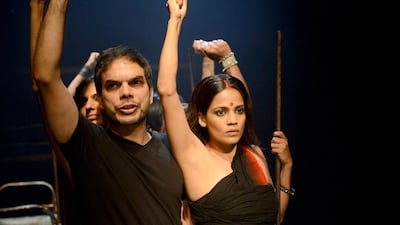When the house lights came up after a thunderous standing ovation, the stage littered with messy, watery detritus from an agonising 90 minutes of live theatre, many in the packed house did not seem to know what to do.
Some sat back down in their seats. Several wiped away tears, others sobbed, still clearly dealing with the impact of watching six women who had just poured out their raw, true-life stories of molestation, abuse, rape, torture and acid attack.
It's not often an audience is so moved by a live production; but then again, Nirbhaya is a work of theatre like no other.
The South African playwright Yael Farber's production, inspired by the gang rape and subsequent death of a New Delhi medical student last December, had a successful and powerful premiere run at the Edinburgh Fringe Festival in August.
Nirbhaya, the Hindi name given to the late victim, means "the fearless one". The five accused in the horrific attack (the sixth committed suicide in prison) were quickly sentenced after a trial that was fast-tracked, which is rare in India. Four of the men are on death row. The fifth, who was 17 at the time, will spend three years in a juvenile correctional facility. The lawyers of the four men sentenced to death have challenged the verdict; a hearing has been scheduled for today.
Farber's production prompted one reviewer to write: "It is one of most powerful pieces of theatre I have ever seen." It was also described as "scorching"; a "piercing scream of a play".
Deborah Macrae, a doctor who lives in Stirling, UK, was one of those moved when she saw the production with friends.
"I've never experienced anything like it," she said. "The emotion in the theatre was so intense. I just wanted to reach out to these women and show them I shared their pain."
Sitting at the back of Edinburgh's Assembly Hall theatre for the run of the show, Farber was amazed at how strongly members of the audience reacted.
"I was stunned by the universality of the currency of grief," said Farber, in an email interview. "From big burly men to petite women – every nationality and gender said a few words to express their personal trauma or their sense of wanting to be a part of the change so needed in their own communities."
After three exhausting but exhilarating months working on the play, Farber is now back home in Montreal, Quebec, spending time with her young daughter.
She is also busy preparing for the forthcoming staging of Nirbhaya in Delhi on December 16, one year to the day of the attack, and keeping close tabs on news in India. She paid particular attention to what happened after the gang rape in Augustof a Mumbai photojournalist at a deserted cotton mill. The victim refused to be silenced by the shame that surrounds rape victims, insisting instead that rape is "not the end of life" and signalling her intentions to return to work the moment her injuries had healed.
Farber found the comments significant.
"The refusal to embrace shame as a response to the attack on her body is empowering to those who have been taught that a devastated and shame-filled silence is the appropriate response," she said.
Farber's previous work was a production of August Strindberg's 19th-century drama Mies Julie, transported to post-apartheid South Africa, that was staged in London. She called her work on Nirbhaya, which is delivered by women telling their own terrible-yet-true stories, including one who was the victim of an acid attack, "an extraordinary experience". Not only was the script pushed out in a few short weeks, but also two of the women on stage had no previous acting experience.
"It was one of the most challenging creative processes of my career – and one of the most inspiring," she said.
In addition to performing Nirbhaya in several Indian cities, Farber is preparing to take the production international – with an eye to pushing for a larger movement. India is already up in arms – since the gruesome incident, thousands of people have taken to the streets to protest against the treatment of women in what is largely a patriarchal society. Recently, the Bollywood actress Kalki Koechlin appeared in an English-language video titled It's My Fault, a satire on the perception that the victims of sexual assaults only have themselves to blame.
"Apart from arranging the tour, we are also reflecting on how to harness the power of the response it has already evoked and how to take that forward," Farber said.
artslife@thenational.ae

Confronting emotions
After a successful, emotional run at the Edinburgh Fringe Festival this summer, the powerful production of Yael Farber's Nirbhaya prepares to be staged in India.
Most popular today
